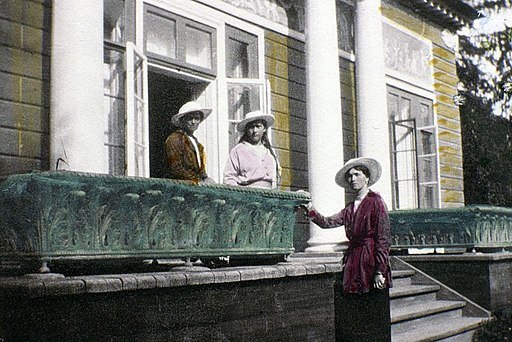Writing about the Romanovs by Gill Paul

A hundred years ago, in the early hours of the 17th of July 1918, Russia’s last royal family were murdered in a bloodthirsty and bungled attack. Yacob Yurovsky, leader of the hit squad, and some of the other killers left testimonies describing what happened. According to them, the first shots ricocheted off jewels the four daughters had sewn into the seams of their clothing, wounding but not killing them. The air was thick with gunsmoke, the floor slippery with the blood of their mother, father and little brother, as well as three servants and the family doctor, who were unlucky enough to share their fate. Maria tried to escape through a locked back door, Olga cowered in a corner with Tatiana, while Anastasia froze rigid with shock, until the men came back to finish them off with bayonet thrusts.
When I read the killers’ testimonies, straight away I wanted to know what was going through the four young women’s minds. At what point did they realise they were going to die? Did they try to bargain or plead for their lives? What were the killers thinking? How could they bring themselves to slaughter innocents? I decided to write about them in a novel because that would allow me to sharpen the facts and imagine what it was like to be there, in their shoes. Fiction can intensify tragedy by making readers care about the protagonists as individuals we can relate to.
There is plenty of primary material to help us get an idea of the girls’ characters. Like the Instagram kids of today, they took hundreds of photographs of themselves as well as home movie footage we can watch on YouTube. There are memoirs left by their tutors and other family friends. And the girls left diaries in which they write about young men they were keen on, in a breathless, excited tone: “He is so affectionate… I love him so much.”
Olga fell for Dmitri Shakh-Bagov, known as Mitya, an officer she nursed at a military hospital that had been hastily set up in the Catherine Palace in 1914. Tatiana was keen on a cavalry officer called Dmitri Malama, a decorated war hero who gave her a gift of a French bulldog. Maria had a favourite officer, Kolya Demenkov, and also had a secret flirtation with one of the guards at the Ipatiev House, where they were held captive in Ekaterinburg. Anastasia had a childish crush on her friend Katya’s brother Viktor Zborovsky.
We know there were several plots to rescue the Romanovs, some devised by foreign secret agents and others by Russian officers loyal to the family. Surely it is not beyond the bounds of credibility that one of the girls’ sweethearts would be involved in some such plan? This was the idea at the core of my 2016 novel The Secret Wife, in which I imagined Dmitri Malama attempting to rescue Tatiana. And in The Lost Daughter (to be published in October 2018) I expand upon Maria’s relationship with the guards at the Ipatiev House – she seems to have had a form of Stockholm Syndrome – and speculate on what might have happened on the night of the murders.
Fiction allows us to imagine alternative outcomes and introduce a little bit of ‘What if?’ history, which seems appropriate in cases like this when an ending is so cruel and senseless. There was plenty of ‘What if?’ history around in the 1920s and 30s as dozens of imposters stepped forward claiming to be family members who had escaped from Ekaterinburg. The one who received the most attention was Anna Anderson, who claimed to be Anastasia (despite speaking no Russian). Some family friends believed her, although not Nicholas’s sister Olga or Alexandra’s sister Irene. The truth that she was a Polish factory worker did not emerge until DNA analysis was carried out in the 1990s.
A hundred years after the murders, scientists are virtually unanimous in believing the remains found in two graves near Ekaterinburg account for the whole family, but there are still a few historians who disagree and in 2016, the Russian Orthodox Church decided to retest the bones. Since the family have been canonised and are now figureheads for the massive resurgence of religion in Russia, they want to be doubly sure.
Hundreds of thousands of pilgrims are expected to travel to Ekaterinburg for the centenary commemorations on the 17th July. Praying to the family, particularly Maria and little Alexei, is said to heal illnesses and afflictions. Yacob Yurovsky would surely be stunned to learn that his actions have caused the family to be venerated in death as they never were in life.







